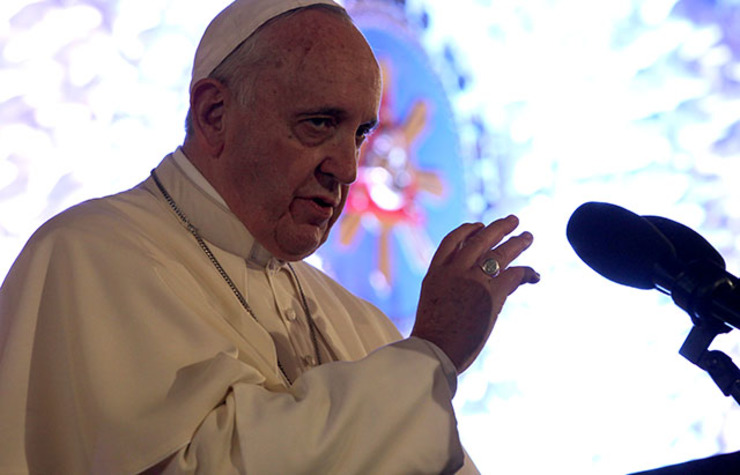'I express my trust that [this] will result in just solutions in accord with the nation's founding principles and respectful of the inalienable rights of all'

DIALOGUE. His Holiness Pope Francis gives the Apostolic Blessing during the General Audience of senior Government Officials and members of the Diplomatic Corps at the Rizal Hall of the Malacañan Palace for the State Visit and Apostolic Journey to the Republic of the Philippines on Friday, January 16, 2015. Photo by Benhur Arcayan /Malacañang Photo Bureau
Since embarking on a two-nation Asian tour this week, Pope Francis has endorsed the ongoing peace process in Mindanao twice.
Addressing about 450 guests at the Malacañang Palace Friday, January 16, Pope Francis commended the "praiseworthy efforts to promote dialogue and cooperation" between followers of different religions in the Philippines.
"In a particular way, I express my trust that the progress made in bringing peace to the south of the country will result in just solutions in accord with the nation's founding principles and respectful of the inalienable rights of all, including the indigenous peoples and religious minorities," Francis said in his first speech in the Philippines.
Francis has made a mark in being a peacemaker after his decision to make a surprise stop at the West Bank went viral. He also brought this message of peace to Sri Lanka.
In the Philippines, Muslim leaders welcomed Francis as he is scheduled to meet with leaders of different religions during his trip.
His comments on the peace process in southern Philippines come at a time when Congress is deliberating a proposed law that seeks to install an autonomous government in the south that will have greater fiscal and political powers than the current one in place.
The establishment of a new region – to be called the Bangsamoro – is aimed at ending more than 4 decades of war in Mindanao.
Before leaving for Sri Lanka on Monday, Francis also cited the gains made in resolving conflict in Mindanao.
“I note with pleasure that last March an agreement was signed to end long years of tension in the Philippines,” Francis told told members of the Vatican diplomatic corps.
The signing of a peace deal between the government and the Philippines' largest organized armed group, the Moro Islamic Liberation Front (MILF), in March 2014 has raised hopes for lasting peace in Mindanao.
MILF leaders invited the Pope to visit Cotabato City through a letter sent to Cardinal Orlando Quevedo, but there was not enough time for the Pope to do so.
In the letter, the MILF asked the Pope to mention the peace process during his visit.
"Of course, we thank him for the endorsement. We also thank Cardinal Quevedo for bringing the letter to the Pope," said MILF chief negotiator Mohagher Iqbal.
The Bangsamoro bill faces rough-sailing in Congress, with a
number of lawmakers raising questions over the constitutionality of installing
a parliamentary form of regional government in the south.
Senator Miriam Defensor Santiago, a constitutional expert, is set to hold two committee meetings focusing on the constitutionality of the bill. Meanwhile, the surviving framers of the Constitution have expressed their support for the proposed law.
The proposed law needs to be passed in a plebisicite before the new autonomous region can be installed.
Aside from the constitutionality of the proposed autonomous region, some of the persistent questions that have been raised include issues on how inclusive the new region will be, especially in terms of territory, indigenous peoples, justice, and religion.

No comments:
Post a Comment
Note: Only a member of this blog may post a comment.